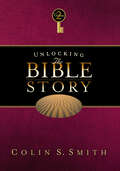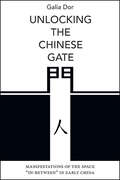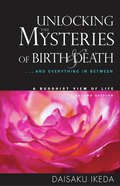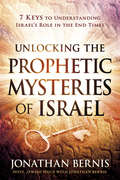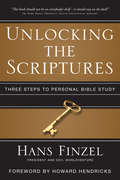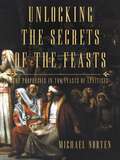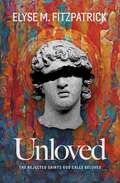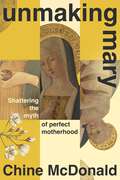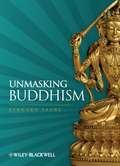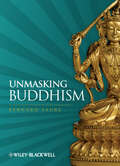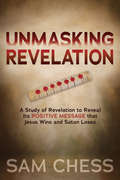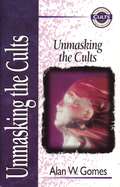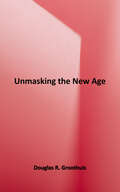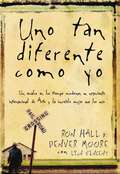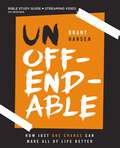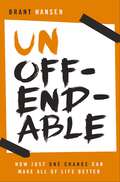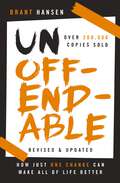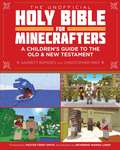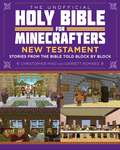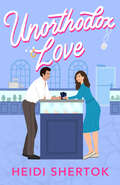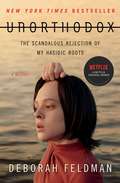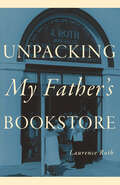- Table View
- List View
Unlocking the Bible Story: Old Testament Volume 2 (Unlocking The Bible Ser. #2)
by Colin S. SmithFor all who are wondering how the pieces fit into the jigsaw of God's revelation, Colin Smith has provided an answer, which is refreshingly simple, biblically accurate, and will prove phenomenally helpful to the serious Bible student and the new beginner alike. — Alistair Begg, senior pastor, Parkside ChurchIn Unlocking the Bible Story, Colin Smith moves gradually through portions of the Bible to explain how it all holds together. He tells God's one grand story of salvation and reflects on major themes along the way. In volume 2 he moves through the Wisdom and Prophetic books, which provide reflections on life with God, judgment for sin, and the hope of restoration. Includes the study guide formerly sold separately. One of the most urgent needs in the church today is for a crisp and comprehensive knowledge of the Bible's storyline. To grasp how the sacred history moves from Genesis to Revelation not only brings fresh insight into how the Bible hangs together, and what each part contributes to the whole, but also is crucial for developing a Christian worldview. Colin Smith has met these needs admirably. I hope these volumes will circulate widely and be read and re-read. — D. A. Carson, research professor New Testament at Trinity Evangelical Divinity School, cofounder of The Gospel Coalition
Unlocking the Bible Story: Old Testament Volume 2 (Unlocking The Bible Ser. #2)
by Colin S. SmithFor all who are wondering how the pieces fit into the jigsaw of God's revelation, Colin Smith has provided an answer, which is refreshingly simple, biblically accurate, and will prove phenomenally helpful to the serious Bible student and the new beginner alike. — Alistair Begg, senior pastor, Parkside ChurchIn Unlocking the Bible Story, Colin Smith moves gradually through portions of the Bible to explain how it all holds together. He tells God's one grand story of salvation and reflects on major themes along the way. In volume 2 he moves through the Wisdom and Prophetic books, which provide reflections on life with God, judgment for sin, and the hope of restoration. Includes the study guide formerly sold separately. One of the most urgent needs in the church today is for a crisp and comprehensive knowledge of the Bible's storyline. To grasp how the sacred history moves from Genesis to Revelation not only brings fresh insight into how the Bible hangs together, and what each part contributes to the whole, but also is crucial for developing a Christian worldview. Colin Smith has met these needs admirably. I hope these volumes will circulate widely and be read and re-read. — D. A. Carson, research professor New Testament at Trinity Evangelical Divinity School, cofounder of The Gospel Coalition
Unlocking the Chinese Gate: Manifestations of the Space "In-Between" in Early China (SUNY series in Chinese Philosophy and Culture)
by Galia DorUnlocking the Chinese Gate offers an innovative analysis of gates in early Chinese thought and material culture. Observing gates from various perspectives—including philosophy, architecture, and psychology—and through the conceptual lens of Chinese correlative thinking, Galia Dor conceptualizes the Chinese gate as a membrane-like apparatus that, from the space "in-between," efficaciously manifests (de) the Way (dao) into the "ten thousand" forms of actualized life. This methodology exposes an open-to-closed gradation between pairs of inside/outside (wai/nei) that resonates throughout the Chinese model of psychocosmic concentric circles. The consequential strategies (e.g., continuity/break, chaos/order) demonstrate how early Chinese cosmological, philosophical, and political idealities, as well as afterlife religious beliefs, were applied—including the various approaches to and practices of self-cultivation. The book sheds new light on ancient Chinese thought and material culture and offers points of comparison to Western thought and modern science, including a model of "decision-gating" that carries relevant implications and insights to our current lives.
Unlocking the Mysteries of Birth & Death: . . . And Everything in Between, A Buddhist View Life
by Daisaku IkedaThis introduction to Nichiren Buddhism explores the philosophical intricacies of life and reveals the wonder inherent in the phases of birth, aging, and death. Core concepts of Nichiren Buddhism, such as the 10 worlds and the nine consciousnesses, illustrate the profundity of human existence. This book provides Buddhists with the tools they need to fully appreciate the connectedness of all beings and to revolutionize their spiritual lives based on this insight. Also explored are how suffering can be transformed to contribute to personal fulfillment and the well-being of others and how modern scientific research accords with ancient Buddhist views. Ultimately, this is both a work of popular philosophy and a book of compelling, compassionate inspiration for Buddhists and non-Buddhists alike that fosters a greater understanding of Nichiren Buddhism. This replaces 0751513741.
Unlocking the Prophetic Mysteries of Israel: 7 Keys to Understanding Israel's Role in the End-Times
by Jonathan BernisWe are witnessing things today that the prophets of Israel longed to see. God is fulfilling His Word in our generation! If you want to understand what God is doing in these last days, you must understand what He is doing with Israel. It is here that the Bible&’s prophecies regarding the end of the age will all unfold. Jonathan Bernis, host of the internationally popular television program Jewish Voice With Jonathan Bernis, with this fascinating book unlocks a greater knowledge about the last days. The book explores questions such as: What crucial role does Israel play in the last days?Why is anti-Semitism on the rise worldwide, and what is at its root?What is the seed promise, and why is Satan so angry about it?What profound promise did God make to Abraham that applies to you today?
Unlocking the Scriptures: Three Steps To Personal Bible Study
by Howard Hendricks Hans FinzelThis updated classic leads the reader through the inductive Bible study process, showing practically how to study the Bible for one's self. With this tool, Christians can learn to relevantly apply God's Word to their lives as His Spirit leads them personally, rather than as some other leader might direct. Originally published in 1986, Finzel's style remains very accessible-providing practical examples that walk the reader through the steps of unpacking Scripture, using actual passages to practice. Free downloadable study guide and activities.
Unlocking the Secrets of the Feasts
by Michael NortenAmazing prophecies of God's plans for the world can befound embedded in the customs of the feasts of Israel. The intricate detail of theprophecies illustrated in the observances of these feasts provide insight intoGod's plan for the ages.
Unlost: Being Found by the One We Are Looking For
by Michael Hidalgo2014 Readers' Choice Award Winner
Unloved: The Rejected Saints God Calls Beloved
by Elyse M. FitzpatrickDo you feel unloved by God? Encounter stories of God's love for the unloved Challenge the lie that you must earn God's love Reflect on God's love with study questions for each chapter Find comfort in God's love for you in Jesus There is good news: you can't earn God's love. Whatever you have done or whatever has been done to you—none of it qualifies or disqualifies you from God's love. In Unloved: The Rejected Saints God Calls Beloved, Elyse M. Fitzpatrick tells stories of God's faithfulness towards the misunderstood and often unfaithful saints of the Bible. Hosea and Gomer Sarah and Abraham Hagar and Photine (the woman at the well) Tamar and Judah Naomi, Ruth, and Boaz Bathsheba and David Mary and Joseph These women and men suffered and failed and were often maligned. And yet they were also loved by God. His love for these messy saints reminds you that God also loves you—generously, lavishly, and freely. Jesus came for the outcasts, men and women burdened by shame or guilt and seen as unloved. And he calls you his beloved.
Unmaking Mary: Shattering the Myth of Perfect Motherhood
by Chine McDonald'Astute, smart, witty and brave. A radical, deeply thoughtful and essential intervention'Lucy Jones, author of Matrescence'A deeply valuable reflection on motherhood'Rowan WilliamsFor two thousand years, the Virgin Mary has been depicted throughout art, literature and culture as symbolising the perfect mother: chaste, beautiful, meek, mild and white. These supposed virtues and symbols have penetrated not just Christianity but wider popular culture; and contributed to harmful views about motherhood and what it is to be a woman.In this part-memoir, part social and theological commentary, Chine McDonald deconstructs the myth of perfect motherhood and shines a light on the dark side of parenting. From birth trauma to post-natal depression, from infertility to the mental load, the motherhood penalty and pressures on women to be and have it all - especially in the church - this book attempts to liberate motherhood from the chains in which it has been placed, reconstructing a more authentic, grace-filled way forward for the most important job in the world.Unmaking Mary will include a foreword written by Beth Allison Barr, author of The Making of Biblical Womanhood.
Unmaking Mary: Shattering the Myth of Perfect Motherhood
by Chine McDonald'Astute, smart, witty and brave. A radical, deeply thoughtful and essential intervention'Lucy Jones, author of Matrescence'A deeply valuable reflection on motherhood'Rowan WilliamsFor two thousand years, the Virgin Mary has been depicted throughout art, literature and culture as symbolising the perfect mother: chaste, beautiful, meek, mild and white. These supposed virtues and symbols have penetrated not just Christianity but wider popular culture; and contributed to harmful views about motherhood and what it is to be a woman.In this part-memoir, part social and theological commentary, Chine McDonald deconstructs the myth of perfect motherhood and shines a light on the dark side of parenting. From birth trauma to post-natal depression, from infertility to the mental load, the motherhood penalty and pressures on women to be and have it all - especially in the church - this book attempts to liberate motherhood from the chains in which it has been placed, reconstructing a more authentic, grace-filled way forward for the most important job in the world.Unmaking Mary will include a foreword written by Beth Allison Barr, author of The Making of Biblical Womanhood.
Unmasking Buddhism
by Bernard FaureAn ideal introduction to Buddhism for anyone who has unanswered questions about one of the world's largest and most popular religions. A fascinating, short book that challenges us to strip away existing preconceptions we may have about Buddhism Considers questions such as: Can we talk of Buddhism as a unified religion or are there many Buddhisms? Is Buddhism a religion of tolerance and pacifism as many people think? And is Buddhism a religion without god(s), or is it more of a philosophy than a religion? Traces the basic history, beliefs and nature of Buddhism in easy-to-understand language Written by renowned Buddhist scholar, Bernard Faure, it is an ideal introduction for anyone who has unanswered questions about one of the world's largest and most popular religions
Unmasking Buddhism
by Bernard FaureAn ideal introduction to Buddhism for anyone who has unanswered questions about one of the world's largest and most popular religions. A fascinating, short book that challenges us to strip away existing preconceptions we may have about Buddhism Considers questions such as: Can we talk of Buddhism as a unified religion or are there many Buddhisms? Is Buddhism a religion of tolerance and pacifism as many people think? And is Buddhism a religion without god(s), or is it more of a philosophy than a religion? Traces the basic history, beliefs and nature of Buddhism in easy-to-understand language Written by renowned Buddhist scholar, Bernard Faure, it is an ideal introduction for anyone who has unanswered questions about one of the world's largest and most popular religions
Unmasking Revelation: A Study of Revelation to Reveal Its Positive Message that Jesus Wins and Satan Loses
by Sam ChessThe Book of Revelation was meant to ignite awe and worship.There is a special blessing promised to all who read and obey the words of Revelation (1:3). Yet many Christians slam their Bible shut before reading because they find the end times prophecy to be confusing, weird, and even scary.Revelation was never meant to be feared or skipped over. In Unmasking Revelation, Sam Chess walks through how Jesus left first century Christians with the hope of His return, and how the letter of Revelation was given as a guide to how it all would end. Jesus was going to victoriously win and satan, and death, and hell, and even the curse of sin itself (22:3) would be purged off this planet!Through Unmasking Revelation, the difficult parts of Revelation become understandable, and the weird and frightening are &“unmasked&” to simply unfold the storyline of Jesus&’ (and Christians&’) final triumphant victory.
Unmasking the Cults
by Alan W. GomesIn this introduction to the Zondervan Guide to Cults and Religious Movements, Dr. Gomes defines the characteristics of a "cult of Christianity" and why such a group subverts the search for spiritual truth. He explains the emotional and spiritual appeal of cults, who is susceptible, and the techniques cult leaders use to attract members. This book, in dealing with a wide range of issues relating to cults and religious movements in general, complements the other books in the series, all of which focus on specific religious groups. -- Why this series? This is an age when countless groups and movements, old and new, mark the religious landscape in our culture, leaving many people confused or uncertain in their search for spiritual truth and meaning. Because few people have the time or opportunity to research these movements fully, these books provide essential information and insights for their spiritual journeys. Except for this book, each book in the series has five sections: - A concise introduction to the group - An overview of the group's theology -- in its own words - Tips for witnessing effectively to members of the group - A bibliography with sources for further study - A comparison chart that shows the essential differences between biblical Christianity and the group -- The writers of these volumes are well qualified to present clear and reliable information and help us discern religious truth from falsehood.
Unmasking the New Age
by Douglas GroothuisWhat is the New Age movement? Is it a conspiracy? What can Christians do about it? In the last ten years, the New Age has shifted out of the counterculture into the mainstream of society. Today its effects are felt in almost every aspect of life--medicine, politics, science, psychology and even religion. --Fortune 500 corporations routinely send their managers to New Age seminars to expand their minds and increase productivity. --Entertainer Shirley MacLaine has written two best-selling books that chronicle her conversion to the New Age. --Doctors and therapists increasingly employ healing techniques that are based on pantheistic principles. --Even advertisers on radio and television, in tune with New Age ideas, are telling us that we have unlimited potential. Douglas Groothuis explains how the New Age combines Eastern mysticism with Western optimism and why it has become so popular. His thorough, biblical analysis helps Christians know how to respond to this aggressive movement.
Uno tan diferente como yo: Un esclavo en los tiempos modernos, un negociante internacional de arte y la inesperada mujer que los unió
by Denver Moore Lynn Vincent Ron HallUn vagabundo peligroso, sin hogar que creció recogiendo algodón en interminable esclavitud. Un comerciante de arte de lujo acostumbrado al mundo de Armani y Chanel. Una mujer valiente con un sueño obstinado. Una historia tan increíble que ningún novelista se atrevería a soñar con ella. Comienza fuera de una choza de quema de plantaciones en Louisiana. . . un bar "honky-tonk" al este de Texas. . . y, sin lugar a dudas, en el corazón de Dios. Se desarrolla en una hacienda de Hollywood. . . una galería de Nueva York de lujo. . . un contenedor de basura de la ciudad. . . un rancho de Texas. Va directo al grano con el dolor, la traición y la brutalidad, pero también brilla con un cambio de vida inesperado a base de el amor. Esta increíble historia que ahora se vuelve a contar incluye además una entrevista con los autores y una guía para el lector que es perfecta para el estudio individual o en grupo.
Unoffendable Bible Study Guide plus Streaming Video: How Just One Change Can Make All of Life Better
by Brant HansenWith deadpan humor and refreshing honesty, Brant Hansen will empower you to experience the joy and freedom of becoming unoffendable.Whether you're scrolling through social media, sitting around the dinner table, or watching the news, it's wrong not to be offended at the way things are in the world right now—right?!Bestselling author Brant Hansen has a different idea. What if "righteous anger" isn't actually biblical? What if anger isn't an effective response to injustice anyway? God does not need you to be angry. Instead, Christ calls us to do something radical and countercultural: Let go of your anger and forgive.In this six-session video Bible study (video access included), Hansen shares practical ways and biblical reasons to let go of anger and your "right" to be offended. Being unoffendable is a choice, and one that will help you flourish in the way God intended.Sessions and video run times:The Myth of Righteous Anger (18:00)What Humans Are Like (18:00)The Physiological Effects of Anger (18:00)What About Injustice? (18:00)How to Actually Do This (17:30)The Difference It Makes (18:00) This study guide has everything you need for a full Bible study experience, including:The study guide itself--with discussion and reflection questions, video notes, and a leader's guide.An individual access code to stream all video sessions online. (DVD also sold separately)Streaming video access code included. Access code subject to expiration after 12/31/2027. Code may be redeemed only by the recipient of this package. Code may not be transferred or sold separately from this package. Internet connection required. Void where prohibited, taxed, or restricted by law. Additional offer details inside
Unoffendable: How Just One Change Can Make All of Life Better
by Brant HansenNot entitled to get angry? Really? It's a radical, provocative idea: We're not entitled to get offended or stay angry. The idea of our own "righteous anger" is a myth. It is the number one problem in our societies today and, as Dallas Willard says, Christians have not been taught out of it. As it turns out, giving up our "right" to be offended can be one of the most freeing, healthy, simplifying, relaxing, refreshing, stress-relieving, encouraging things we can do. In Unoffendable readers will find something of immeasurable value--a concrete, practical way to live life with less stress. They'll adjust their expectations to fit human nature and replace perpetual anger with refreshing humility and gratitude. The book offers a unique viewpoint, challenging the idea that Christians can ever harbor "righteous anger" or that there evenis such a thing for believers. Few other books exist with such a radical, provocative proposal to consider. We have no right to anger. We are to get rid of it, period. Completely. And it is possible to choose to be "unoffendable. " Through the author's winsome, humorous, and conversational style, this book doesn't add another thing to do on a stressed-out person's ever-growing list. Better, it actually seeks to lift religious burdens from readers' backs and allow them to experience the joy of gratitude, perhaps for the first time, every single day of their lives.
Unoffendable: How Just One Change Can Make All of Life Better (updated with two new chapters)
by Brant HansenUnoffendable, now revised and updated with two new chapters, gives you a concrete, practical way to live life with less stress. In our easily offended, cancel-culture society, learn how to replace perpetual frustration and anger with refreshing humility and gratitude.It turns out giving up your "right" to be offended can be one of the most freeing, healthy, simplifying, relaxing, refreshing, stress-relieving, encouraging things you can do. It's a radical, provocative idea: We're not entitled to get offended or stay angry. The idea of our own "righteous anger" is a myth. It is the number one problem in our societies today and, as Dallas Willard says, Christians have not been taught out of it. But what if Christians were the most unoffendable people on the planet?In Unoffendable you will find concrete, practical ways to live life with less stress, including:Adjusting your expectations to fit human natureReplacing perpetual anger with refreshing humility and gratitudeEmbracing forgiveness and beginning to love others in unexpected waysNewly revised with two brand-new chapters on forgiveness and what Hansen has learned since writing his original book, this updated edition of the bestselling book is a must-read for every Christian. In a humorous and conversational style, Unoffendable seeks to lift religious burdens from our backs and allow us to experience the joy of gratitude, perhaps for the first time, every single day of our lives—flourishing the way God intended.
Unofficial Holy Bible for Minecrafters: A Children's Guide to the Old and New Testament
by Christopher Miko Garrett RominesAn Exploration of the Old and New Testament for Young Readers Unlike Any You’ve Ever Seen Before! Since 2009, Minecraft has swept the gaming world by storm. More than one hundred million games have been sold. Parents of children who play Minecraft will love this fun, educational collection of Bible stories. With the world of Minecraft as a backdrop using vivid, full-color screenshots, children will experience the Bible as never before. Authors Chris Miko and Garrett Romines are teachers who have used Minecraft to create imaginative worlds in their classrooms. Now, they have created Bible stories with virtual blocks to produce vibrant, 3-D worlds filled with adventure and astonishing imagination. With fascinating scripture and narrative simplified to teach young readers the most powerful stories of our time, this is the perfect gift. The images created are not only of magnificent, vast terrains often found in the Minecraft video game but also feature artfully recreated legendary characters, such as Adam and Eve, and superb architectural design builds of the pyramids and Noah’s Ark. A range of significant biblical characters such as Jesus and Pharaoh are brought together in fun, colorful scenes kids will treasure. Engaging teachings from the Tower of Babel and The Story of Abram and Lot, to name a few, are all in this book. With over 270 images, young readers will explore stories from a vast number of Bible favorites such as The Story of Creation, The Journey of Abraham, Joseph and the Colored Dreamcoat, David and Goliath, Moses’s Great Journey, The Birth of Jesus, The Last Supper, and many more! The Unofficial Holy Bible for Minecrafters makes the Bible more entertaining, engaging, and accessible for children than ever!
Unofficial Holy Bible for Minecrafters: Stories from the Bible Told Block by Block
by Christopher Miko Garrett RominesMinecraft has swept the world by storm. More than one hundred million games have been sold. Parents of children who play Minecraft will love this fun, educational collection of Bible stories. <P><P>With the world of Minecraft as a backdrop using vivid, full-color screenshots, children will experience the Bible as never before. Authors Garrett Romines and Christopher Miko are teachers who have used Minecraft to create imaginative worlds in their classrooms. Now, they have created Bible stories with virtual blocks to produce vibrant, 3-D worlds filled with adventure and astonishing imagination. With fascinating scripture and narrative simplified to teach young readers, this is the perfect gift. The images created are not only of magnificent, vast terrains often found in Minecraft but also feature artfully re-created Bible characters, such as Adam and Eve, and superb designs of the pyramids and Noah's ark. A range of biblical characters such as Jesus and Pharaoh are offered in fun, colorful scenes kids will treasure. <P>Engaging stories including the Tower of Babel and the story of Abram and Lot, to name a few, are here. With over 400 images, young readers will explore the story of creation, the journey of Abraham, David and Goliath, Moses's great journey, the birth of Jesus, the Last Supper, and many more stories! The Unofficial Holy Bible for Minecrafters makes the Bible more entertaining, engaging, and accessible for children than ever!
Unorthodox Love: A Novel
by Heidi ShertokPerfect for fans of Ali Hazelwood and Sophie Kinsella, Heidi Shertok&’s delightful debut about love and family will tug on your heartstrings.Twenty-nine-year-old Penina longs for true love and marriage, but being infertile in the Orthodox Jewish community means she&’s rarely matched with the cream of the crop—or even skim milk two weeks past its expiration date. Matchmakers either set her up with men twice her age or those with serious mommy issues. At this point, she might as well wear a sign around her neck that says &“professional virgin.&”As if things weren&’t bad enough, her sister Libby then shares a terrible secret: her husband&’s failed businesses have already put strain on their marriage, and now they might also lose their family home. Penina is desperate to help, so when a secretly gay Orthodox Jew offers a payout in exchange for a fake marriage, it feels like kismet. Who needs true love anyway?Enter Sam Kleinfeld. Rude, secular, undeniably sexy, and also…Penina&’s new boss. The last thing he wants is a relationship, especially not with a beautiful, smart-mouthed employee. But soon an attraction builds that they both can&’t ignore. Will Penina follow her heart and find true love, or will she stick to the traditions she knows best?
Unorthodox: The Scandalous Rejection of My Hasidic Roots
by Deborah FeldmanAs a member of the strictly religious Satmar sect of Hasidic Judaism, Deborah Feldman grew up under a code of relentlessly enforced customs governing everything from what she could wear and to whom she could speak to what she was allowed to read. It was stolen moments spent with the empowered literary characters of Jane Austen and Louisa May Alcott that helped her to imagine an alternative way of life. Trapped as a teenager in a sexually and emotionally dysfunctional marriage to a man she barely knew, the tension between Deborah's desires and her responsibilities as a good Satmar girl grew more explosive until she gave birth at helped her to imagine an alternative way of life. She had no idea how to seize this dream that seemed to beckon to her from the skyscrapers of Manhattan, but she was determined to find a way. The tension between Deborah's desires and her responsibilities as a good Satmar girl grew more explosive until, at the age of seventeen, she found herself trapped in a sexually and emotionally dysfunctional marriage to a man she had met for only thirty minutes before they became engaged. As a result, she experienced debilitating anxiety that was exacerbated by the public shame of having failed to immediately consummate her marriage and thus serve her husband. But it wasn't until she had a child at nineteen that Deborah realized more than just her own future was at stake, and that, regardless of the obstacles, she would have to forge a path--for herself and her son--to happiness and freedom. *** From UNorthodox: I have secrets too. Maybe Bubby knows about them, but she won't say anything about mine if I don't say anything about hers. Or perhaps I have only imagined her complicity; there is a chance this agreement is only one-sided. Would Bubby tattle on me? I hide my books under the bed, and she hides hers in her lingerie, and once a year when Zeidy inspects the house for Passover, poking through our things, we hover anxiously, terrified of being found out. Zeidy even rifles through my underwear drawer. Only when I tell him that this is my private female stuff does he desist, unwilling to violate a woman's privacy, and move on to my grandmother's wardrobe. She is as defensive as I am when he rummages through her lingerie. We both know that our small stash of secular books would shock my grandfather more than a pile of chametz, the forbidden leavening, ever could. Bubby might get away with a scolding, but I would not be spared the full extent of my grandfather's wrath. When my zeide gets angry, his long white beard seems to lift up and spread around his face like a fiery flame. I wither instantly in the heat of his scorn. "Der tumeneh shprach!" he thunders at me when he overhears me speaking to my cousins in English. An impure language, Zeidy says, acts like a poison to the soul. Reading an English book is even worse; it leaves my soul vulnerable, a welcome mat put out for the devil.
Unpacking My Father's Bookstore
by Laurence RothUnpacking My Father’s Bookstore brings to life the history of J. Roth / Bookseller of Fine & Scholarly Judaica, which was a microcosm of the Los Angeles Jewish community from 1966 to 1994 and one of the premier Jewish bookstores in the United States. Blending critical analysis with a personal account of growing up in his father’s bookstore, and connecting both to larger forces that helped shape Jewish and American book retailing in the twentieth-century, Laurence Roth crafts a richly felt narrative about his family’s Jewish experience in America. It is a reminder, too, that while most independent bookstores like J. Roth Bookseller disappear from history, these retailers often had outsized effects on their communities. Breaking with conventional modes of scholarship, Unpacking My Father’s Bookstore tells a unique and troubled story that rarely gets told, one that is both personal and analytical, theoretical but rooted in the everyday.
